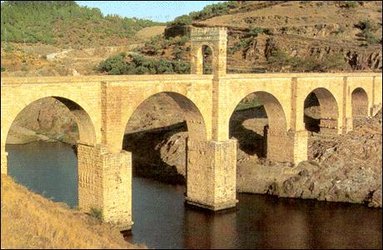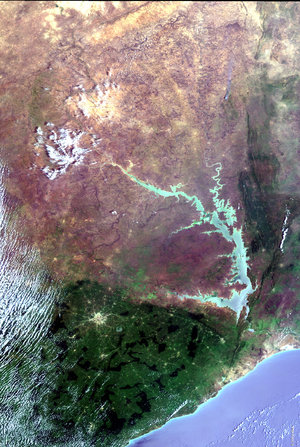Alcantara FAQ
Interested in Alcantara and wondering whether you should get involved?
Here is a list of frequently asked questions and answers.
1. What is Alcantara?
Alcantara is an initiative of the European Space Agency's General Studies Programme that aims at enhancing the collaboration and knowledge transfer between universities from the ESA Member States (click here for complete list) and overseas universities in cooperation with industry. As part of the small projects within Alcantara, a 'host' university in an ESA Member State is funded for them to support a visiting research fellow from overseas groups for the duration of the project (typically from 6 moths to 1 year).
2. What role does space play in this collaboration?
In the frame of Alcantara, ESA funds short research projects that deal with practical issues specific to a region in which data from satellites and space missions can support services (e.g., water management, precision farming, flood mapping, etc.). Satellite data for space science can also play a role in some projects, but the constant element is Alcantara is the link of the space mission data and the concerned geographical region. For examples of previous Alcantara projects, please click here (opens as PDF).
3. How does an Alcantara project work?
A host institution (university or research institute) from one of the ESA Member States responds to one or more studies from the Announcement of Opportunity published by ESA on a certain topic. Within this response the research leader is required to propose a team which includes an invited visiting post-doctoral Research Fellow from an overseas (non-ESA Member State) institution. The team should include industrial partners (so-called 'mentors') that are interested in the application of the research or simply wish to follow directly the topic due to their interest in the concerned region, they will participate in the project reviews as advisors. The funding for the participation of the industrial partners is covered by ESA but is limited as most of the funding is expected to support the researchers. If selected by ESA, the study including the subsistence allowance of the visiting post-doc will be funded.
4. How are the topics in Alcantara picked up?
Topics are defined internally at ESA on the basis of inputs on areas of interests of the Member States as identified by their National Delegations to ESA. These are often linked to cooperation on satellite-related R&D.
5. Who can apply?
A group of at least two researchers from the host institution (university or research institute) from one of the ESA Member States. The person responsible for the study must be a senior research fellow or professor, having at least five (preferably more) years of post-doctoral research experience in a field relevant to the study. The other team member must be either a post-graduate student or a research fellow with maximum five years of post-doctoral research experience.
6. What are the eligibility criteria?
The study should be led by a team based at a host institution within the payroll of one of the ESA Member States. The project should be of relevance to the Announcement of Opportunity and make a meaningful contribution to the concerned geographical region. The host institution has to propose a visiting Research Fellow from an overseas university or research institute. The visiting Research Fellow should be based in and conduct his/her research work in one of the countries in this region.
7. What are the requirements to be eligible as a suitable candidate for an 'External' i.e. visiting Research Fellow?
He/she should be based in an academic institution in a non-ESA Member State and should be a well-established researcher with an outstanding publication record. Preferably he/she already would have links with the entities that are responsible for providing operational services to the citizens in the region and hence would have a very good overview of regional scientific and technical challenges with a social impact, and the necessary tools to address them. The visiting research fellow should be available to temporarily relocate at the initiator's host institution for part of the study duration.
8. What is the role of the industry?
Industrial partners play the role of 'mentors' and contribute with their experience in implementing solutions. They do not need to participate in the research and their participation is supported by ESA only as to allow their input in project reviews, including travel costs. The benefit of industrial partners is gaining access to a professional network in countries and areas of their interest.
9. How do I suggest such interest areas to ESA National Delegations?
If you know your national contact point for ESA projects, try to make them well aware of your interests and the potential collaboration with the overseas institution(s).
If you do not know your contact point (e.g. because you are new to ESA or because during your participation in a previous ESA project you did not need to interact with your National Delegation to ESA), one possible way to find out is to contact your industrial partners and prepare a joint statement with them on your potential interest in Alcantara. Delegations to ESA's Industrial Policy Committee and International Relations Committee will receive regular reports on Alcantara activities from the ESA executive and the General Studies Programme Office.
10. My topic doesn't fit into any area of interests proposed by ESA. Can I still apply?
No studies other than those proposed in the Announcement of Opportunity will be funded by ESA.
11. Are travelling and subsistence covered for the visiting research fellows?
The visiting research fellow's travel to the host institution and his/her subsistence are covered by ESA within the study funds.
12. For how long is an Alcantara study supposed to last?
Alcantara studies should be completed within 1 year.
13. What is the value of the study grant?
The maximum value of study budget is 100 k€, plus a certain allocation for travel costs that will depend on the specific case, this allocation will be proposed by the host university with a justification and if acceptable will be approved by ESA, on top of the study budget.
14. What is expected at the end of Alcantara projects?
At least one peer-reviewed publication will be required at the end of the study. Papers that have been submitted but not yet approved for publication will be acceptable. A final report according to ESA guidelines (these will be provided in due time) is also required. Finally, there will be a final presentation at ESA premises after the study has concluded.
15. How often are the Announcements of Opportunity? When is the next call?
There is an Announcement of Opportunity every year. The next Announcement of Opportunity is scheduled for November 2018 and will be open for a minimum of 8 weeks.
16. How can I apply?
To find out on ESA´s Electronic Tendering System (EMITS) where the Alcantara 'Invitation to Tender' including the next Announcement of Opportunity will be published, please click here.
17. What language can I use during my application process?
All mandatory documentation shall be in English. Additional information can be provided in a language that is relevant to the concerned region (French, as one of the two official ESA languages, or another language used in any of the ESA Member States for the information to be considered).
18. Who can I contact for more information?
Contact:
Andrés Gálvez
Study Technical Officer
European Space Agency - HQ (PPC-PF)
Andres.Galvez @ esa.int







